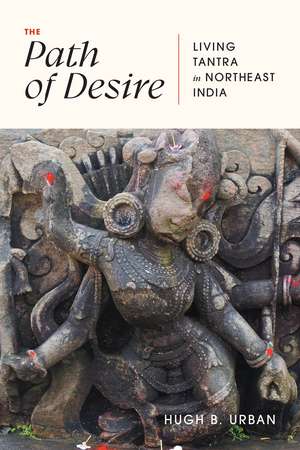The Path of Desire: Living Tantra in Northeast India
Autor Hugh B. Urbanen Limba Engleză Paperback – 26 mar 2024
Tantra, one of the most important religious currents in South Asia, is often misrepresented as little more than ritualized sex. Through a mixture of ethnography and history, Hugh B. Urban reveals a dynamic living tradition behind the sensationalist stories. Urban shows that Tantric desire goes beyond the erotic, encompassing such quotidian experiences as childbearing and healing. He traces these holistic desires through a series of unique practices: institutional Tantra centered on gurus and esoteric rituals; public Tantra marked by performance and festival; folk Tantra focused on magic and personal well-being; and popular Tantra imagined in fiction, film, and digital media. The result is a provocative new description of Hindu Tantra that challenges us to approach religion as something always entwined with politics and culture, thoroughly entangled with ordinary needs and desires.
| Toate formatele și edițiile | Preț | Express |
|---|---|---|
| Paperback (1) | 185.26 lei 3-5 săpt. | +16.05 lei 7-13 zile |
| University of Chicago Press – 26 mar 2024 | 185.26 lei 3-5 săpt. | +16.05 lei 7-13 zile |
| Hardback (1) | 575.87 lei 6-8 săpt. | |
| University of Chicago Press – 27 mar 2024 | 575.87 lei 6-8 săpt. |
Preț: 185.26 lei
Nou
Puncte Express: 278
Preț estimativ în valută:
35.45€ • 36.73$ • 29.59£
35.45€ • 36.73$ • 29.59£
Carte disponibilă
Livrare economică 01-15 martie
Livrare express 15-21 februarie pentru 26.04 lei
Preluare comenzi: 021 569.72.76
Specificații
ISBN-13: 9780226831121
ISBN-10: 0226831124
Pagini: 288
Ilustrații: 36 halftones, 2 line drawings, 3 tables
Dimensiuni: 152 x 229 x 25 mm
Greutate: 0.42 kg
Editura: University of Chicago Press
Colecția University of Chicago Press
ISBN-10: 0226831124
Pagini: 288
Ilustrații: 36 halftones, 2 line drawings, 3 tables
Dimensiuni: 152 x 229 x 25 mm
Greutate: 0.42 kg
Editura: University of Chicago Press
Colecția University of Chicago Press
Notă biografică
Hugh B. Urban is College of Arts and Sciences Distinguished Professor at the Ohio State University. He is the author of numerous books including Secrecy: Silence, Power, and Religion, also published by the University of Chicago Press.
Cuprins
List of Figures and Tables
Introduction. The Path of Desire: Living Tantra, Vernacular Religion, and the Study of Secrets
Chapter 1. The Left-Hand Path: Secrecy, Transgression, and the Kaula Tradition in Assam
Chapter 2. “The Land of Black Magic”: Healing, Enchantment, and Witchcraft
Chapter 3. The Politics of Sacrifice: Blood Offerings and the Struggle over Local and National Identity in Modern India
Chapter 4. Dancing for the Snake: Possession, Performance, and Gender in Manasā Pūjā
Chapter 5. “The Cradle of Tantra”: Modern Transformations of a Tantric Center from Nationalist Symbol to Tourist Destination
Chapter 6. “Sinister Tāntriks”: Tantra in Popular Culture, Fiction, and Film
Conclusions. The Path of Desire in the Age of Capital: Living Tantra in the Context of Globalization and Neoliberalism
Acknowledgments and Entanglements
Notes
Selected Bibliography
Index
Introduction. The Path of Desire: Living Tantra, Vernacular Religion, and the Study of Secrets
Chapter 1. The Left-Hand Path: Secrecy, Transgression, and the Kaula Tradition in Assam
Chapter 2. “The Land of Black Magic”: Healing, Enchantment, and Witchcraft
Chapter 3. The Politics of Sacrifice: Blood Offerings and the Struggle over Local and National Identity in Modern India
Chapter 4. Dancing for the Snake: Possession, Performance, and Gender in Manasā Pūjā
Chapter 5. “The Cradle of Tantra”: Modern Transformations of a Tantric Center from Nationalist Symbol to Tourist Destination
Chapter 6. “Sinister Tāntriks”: Tantra in Popular Culture, Fiction, and Film
Conclusions. The Path of Desire in the Age of Capital: Living Tantra in the Context of Globalization and Neoliberalism
Acknowledgments and Entanglements
Notes
Selected Bibliography
Index
Recenzii
“Set in the lush hills of northeast India among Hindu communities that practice diverse and sometimes transgressive rituals, this book is about desire, but it’s also about the path that may lead us through tangled webs of experience into well-being and beyond. Through well-crafted narrative and patient attention to daily life, Urban contributes a rich and detailed analysis of texts, histories, rituals, and sensibilities.”
“This engaging book opens new vistas in the study of living Tantric traditions. It shows how Tantra is embedded in concrete social realities, especially in Assam. A must-read for those interested in contemporary religion in India.”
“Urban skillfully combines historiography and ethnography to reveal the remarkably complex dimensions of Tantra in northeast India, including a brilliant analysis of the many aspects of desire. He also explores ongoing developments in Tantra in the larger contexts of globalization and the influences of nationalism, neoliberalism, and popular culture.”
“The Path of Desire is a skillfully crafted and readable ethnography of ‘living Tantra’ in the twenty-first century. In this powerful account, Urban refuses to simplify complex entanglements surrounding female sexual agency, menstruation, and indigenous identities that endure—and thrive—despite confrontations with nationalism, tourism, neoliberalism, and globalization.”
